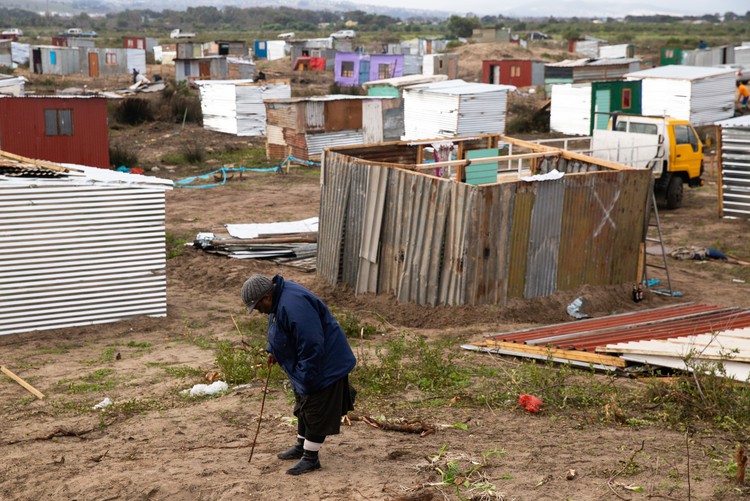Covid-19: Global experts suggest plan for informal settlements
Basic income, food support, and an evictions freeze
Global public health experts have put forward a set of proposals for how governments should respond to Covid-19 in informal settlements. The risk of mass Covid-19 transmission within informal settlements is high in South Africa, and across the world. The spread of Covid-19 has until recently favoured more developed countries. However, residents of informal settlements may be the people hit hardest by Covid-19, both by the virus itself as well the measures to reduce infections.
In response to this looming crisis, 18 experts in public health, epidemiology, and other field have published a policy plan to reduce the risk of transmission of Covid-19 in informal settlements, and to strengthen these communities’ ability to handle what will follow. The authors are from institutions in several countries including India, Bangladesh, Brazil, Egypt, Cameroon, Kenya, the UK and US. One of the authors has a South African affiliation: Professor Tolullah Oni of the Universities of Cape Town and Cambridge.
The report, “Slum Health: Arresting COVID-19 & Improving Well-Being in Urban Informal Settlements”, draws on the authors’ various experiences in handling public responses to the Ebola epidemic in West Africa, and the HIV pandemic. Their plan calls for urgent government intervention to prevent the worst possibilities of the disease, and to “promote social and economic resilience that extends beyond the immediate crises”.
Approximately one billion people live in informal settlements or slums. Slums are technically defined by UN Habitat as areas in which shelter lacks one or more of durability, space, access to improved water and sanitation, and security of tenure.
In South Africa, at a minimum, between 2.9 and 3.6 million people live in informal settlements, although the true figure is likely “significantly higher”, according to a May 2018 paper by the Socio-Economic Rights Institute of South Africa.
According to the Slum Health report, the nature of informal settlements lends itself to increased risk of disease transmission - high densities, and short supply of water, toilets, sewers, drainage, waste collection, and secure and adequate housing. Residents of informal settlements, by virtue of their vulnerable economic status, do not have access to healthcare and supporting structures that could mitigate the effects of disease.
The report warns that “top-down strategies” by governments to arrest the spread of disease are vulnerable to failure, as residents of informal settlements often have “legitimate mistrust and fear of government and outsiders claiming to help”.
The plan calls for eight immediate interventions by governments of countries with informal settlements. These are:
-
Community-led emergency planning committees should be created to coordinate actions related to disease prevention, potential isolation and physical distancing.
-
Immediate moratorium on evictions. The authors note that, “Forced evictions, sometimes in the name of hygiene and dispersing dense slum populations to avoid communicable disease spread has regularly contributed to greater spread of disease among both the displaced populations and the general population”.
-
Immediate guarantee of payments to the poor, with a proposed minimum payment that can cover food, rent, utilities and other basic needs for three months. To achieve this, the plan calls for the IMF, World Bank and bilateral lending institutions to end debt interest and even principal payments for all low-income countries and those with large populations living in informal settlements.
-
Community health workers should be sent to informal settlements. This intervention should include the use of informal health providers (such as sangomas in South Africa). These people are typically more trusted than government health officials, and should be trained to both protect themselves and others, detect symptoms and report possible cases to health authorities.
-
Immediately improve access to water and sanitation, with the deployment of water trucks, sanitising stations, and portable toilets. The use of shared water points is a transmission risk and should be avoided.
-
Food support, particularly cooked meals, should be provided to all those in the informal settlements and living on the streets. Those living in informal settlements often rely on street vendors for food, or must rely on polluting cooking sources that can be harmful to those sharing the indoor space.
-
Governments must develop a plan to gather, remove and process solid waste in informal settlements.
-
Emergency vehicles should have dedicated routes into and out of informal settlements, and mobile clinics must be sent to informal settlements.
Support independent journalism
Donate using Payfast

© 2020 GroundUp.
This article is licensed under a Creative Commons Attribution-NoDerivatives 4.0 International License.
You may republish this article, so long as you credit the authors and GroundUp, and do not change the text. Please include a link back to the original article.

